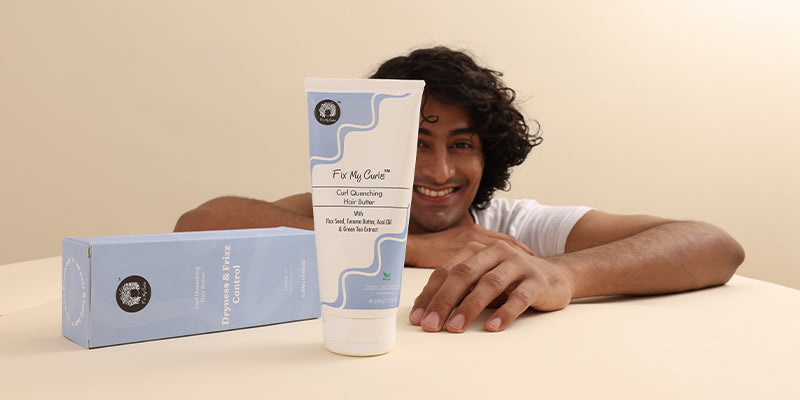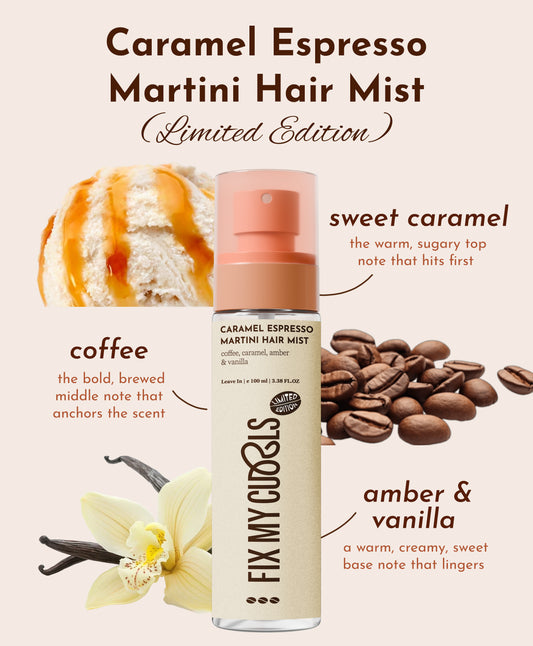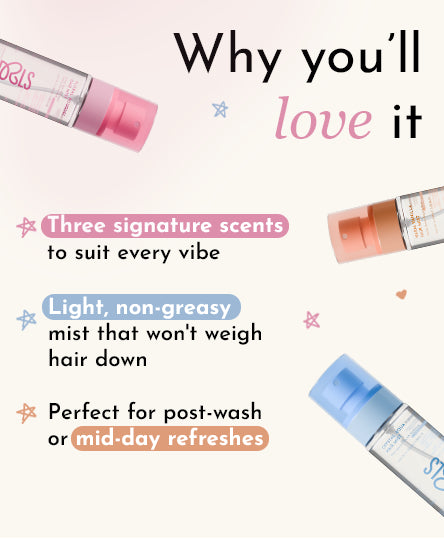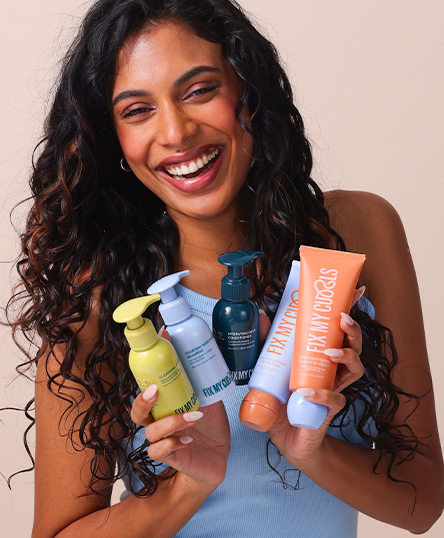Sulfates vs. Sulfate-Free: What Your Curls Actually Need in a Shampoo


Did you ever wonder if your shampoo is more damaging than beneficial? In loving and maintaining your natural curls, every compound matters. Today, we are investigating one of the biggest controversies in curly hair care: sulfates vs. sulfate-free products. If you have ever wasted hours researching curly hair shampoo, you know that the secret to the best care for your curls lies in understanding these ingredients. Let's peel back the mystery but not too much at first—bear with us, and your curls might just thank you.
Understanding Sulfates
Sulfates are the cleansers that are in most regular shampoos. They are the ones providing that rich lather and deep cleaning. Yet, for curls, which naturally dry out more easily, those harsh cleansers may not be best buddies.
Characteristics of Sulfates
-
Powerful Cleansing Ingredients: Sulfates such as Sodium Lauryl Sulfate (SLS) and Sodium Laureth Sulfate (SLES) break down oils and dirt.
-
Rich Lather: They produce the foam that most equate with a good wash.
-
Potential Downsides: Their strong cleansing power can strip the natural oils needed for healthy curls.
Why is this important? Curly hair needs moisture to stay defined and springy. When you strip away natural oils, your curls can become frizzy, dry, or even breakage-prone.
The Rise of Sulfate-Free Shampoos in Curly Hair Care
Sulfate-free shampoos clean gently without stripping the hair of its natural moisture. This is especially beneficial for those with naturally dry and more delicate curls.
Benefits of Sulfate-Free Shampoos
-
Maintains Natural Oils: Preserves the natural moisture of the hair.
-
Reduces Frizz and Breakage: Gentle cleansing maintains the integrity of the hair.
-
Calms the Scalp: Often contains ingredients that calm and soothe the scalp skin, minimising irritation.
-
Best for Sensitive Scalp: A mild formula causes less irritation and fewer scalp health concerns.
Most sulfate-free shampoos use alternative surfactants like cocamidopropyl betaine or decyl glucoside. They still clean without the irritation caused by regular sulfates.
When Might Sulfates Still Have a Place?
Though sulfate-free shampoos are typically the go-to for curly hair, there are times when a sulfate shampoo could come in handy, if only to thoroughly detox your scalp.
Situation to Consider a Sulfate Shampoo
-
Deep Cleaning: If your hair has accumulated heavy styling products, silicones, or excess oil, a sulfate shampoo can deep clean.
-
Occasional Use: Using sulfates every so often won't kill your curls, as long as you follow up with a deep conditioner.
-
Balancing Act: Some curl care regimens include an occasional detox to remove stubborn buildup that sulfate-free shampoos might miss.
Even then, it's necessary to use these products in moderation and constantly restore moisture using a moisturising conditioner or mask.
Why Should Your Curls Be Moisturised?
Your curls require moisture because curly hair is unique in structure compared to other hair types. Each strand forms coils and coils that slow the diffusion of the scalp's natural oils, requiring curls to need added moisture and extra attention.
The Role of Moisture
-
Improved Definition of Curls: Moisturising curls ensures they remain defined and bouncy.
-
Less Frizz: When your hair is fully hydrated, the frizz reduces dramatically.
-
Better Elasticity: Moisturised hair is tougher and less prone to breaking while styling.
Much Needed Ingredients in a Curly Hair Shampoo
When choosing a shampoo, pay attention to the ingredients list. The correct ingredients not only cleanse your hair but also nourish it overall.
Must-Have Ingredients for Curly Hair
-
Humectants: Humectants like glycerin draw moisture into your hair and keep it hydrated.
-
Natural Oils and Butters: Shea butter, mango butter, and coconut oil moisturise and shield curls.
-
Soothing Botanicals: Tea tree oil, neroli oil, and apple cider vinegar can calm the scalp and reduce irritation.
-
Proteins: Hydrolysed proteins strengthen the hair shaft, which is especially beneficial for breakage-prone curls.
-
Mild Surfactants: Find alternative cleansers that provide a gentle cleaning effect without stripping essential moisture.
How to Choose Your Curly Hair Shampoo
Now that you are familiar with the fundamentals, the following are some handy tips for selecting the right shampoo for your curly hair:
-
Check the Label: Check "sulfate-free" labelling if you do not want to use harsh cleansers.
-
Ingredient List: Look for products loaded with natural oils, butters, and humectants.
-
Hair Needs: Consider your hair needs—dry, damaged, or detoxifying hair.
-
Usage Frequency: For everyday curls, a gentle, moisturising shampoo is best. Reserve sulfate shampoos for occasional deep cleans.
-
Test and Adjust: Each curl is different. You might need to experiment with different products before deciding on what works for you.
Quick Tip: A good curly hair shampoo not only cleans your hair but also moisturises it from roots to ends.
The Fix My Curls Solution: Tailored Shampoos for Every Curl
At Fix My Curls, we believe that every curl deserves a personalised approach to care. That’s why we’ve developed two standout products designed specifically with your curls in mind.
1. Cleansing Shampoo – For a Deep Yet Gentle Reset
Our Cleansing Shampoo is a sulfate-free cleanser that renews curls by stripping buildup without taking away natural oils. It has apple cider vinegar to balance pH, tea tree oil to calm the scalp, and sugar cane to clear buildup. Use 2–3 pumps on damp hands, lather onto your scalp, massage for 2–3 minutes, then rinse and follow with a deep conditioner.
2. Everyday Moisturising Shampoo – For Nourishment on the Go
Our sulfate-free Daily Moisturising Shampoo is ideal for a mid-week cleanse or fast post-workout rinse, delivering gentle cleansing with an extra dose of moisture. It contains mango butter for slip and softness, shea butter to condition and define curls, and neroli oil for shine and scalp calming. Apply 3-4 pumps for medium-length hair, adjust for longer hair, and apply evenly throughout the scalp and lengths before rinsing for soft, moisturised curls.
Making the Best Decision for Your Curl Journey
Understanding the difference between sulfate and sulfate-free shampoos is key to making a very informed decision about your hair care. Let's get down to the fundamentals:
-
Sulfates provide a good clean, but are too strong for daily use on curly hair.
-
Sulfate-free products, on the other hand, keep natural oils intact and offer gentle cleansing that respects your curls.
-
Moisturising products are vital to keeping your curls healthy, bouncy, and well-defined.
-
Sometimes, a mixture of both sulfate and sulfate-free products will be the best of both worlds, depending on your hair needs.
For those who are considering converting to a more gentle routine, remember that your hair is worth a shampoo that does not merely cleanse but cares for it. There is no universal solution; the best product is the one that knows your special curls.
The Future of Curly Hair Care
Travelling through the land of curly hair care can be a journey of trial and error. But power is knowledge. Knowing the role of sulfates and the advantages of sulfate-free products, you can make decisions that maximise the natural beauty of your curls.
Celebrate the controversy, try out your routine, and most importantly, hear what your hair has to say. Your path towards healthier, more vibrant curls may begin with nothing more than a small adjustment in your shampoo. Shop our thoughtfully edited range of shampoo for curly hair and experience the difference our formula makes.
With good care, your curls can be more than a style—they can be a statement of confidence, health, and inner beauty. So go on, join the Fix My Curls community, and treat your curls to the pampering they deserve.









